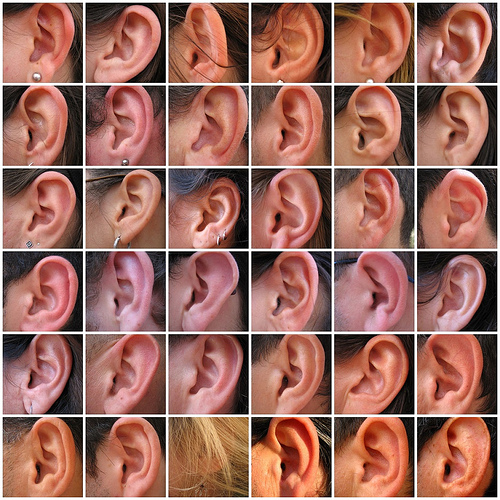JOURNALING is a way of giving voice to our inner thoughts and feelings; in a very real sense, it’s a monologue for an audience of one. But journal writing can help us develop more than one voice and in more than one form. We can write in the child’s voice, the teenager’s voice, and the adult voice in forms as diverse as dialog, gossip, argument, free association, poetry, and song. We can imitate sounds of others around us, using dialect and tone. We can also enrich our writing with descriptions of sound. Noises — blatt, splat, and phht!
But before we can effectively record what we hear, and before our writing can express itself lyrically, we need to learn to listen. We need to raise our level of “hearing awareness.” In addition, being more sense-aware will improve your journaling and writing in general by helping you express yourself more fully.
Here is a fun exercise to get you started:
- Wherever you are, close your eyes and listen. What do you hear? After a few minutes, open your eyes and make a list of the sounds you heard.
– - What does each sound remind you of? For example, what do the dry leaves sound like in the wind? Voices whispering? Insects rubbing their wings together? Rattlesnakes? Let your imagination carry you along. For each sound you listed, write at least one other thing that makes a similar sound.
– - Now, attempt to write each sound phonetically (this is known as onomatopoeia). For example, maybe the a light rain was dripping rhythmically into the rain gutters. “Tink-a-tap, tink-a-tap, tink-a-tap” might be the sound you would write. Try to write how it really sounded, and avoid typical English representations, such as “boom!”, “oink” and “meow” (unless that’s really how it sounded to you).
– - Which sounds remind you of something in your past? Write a short scene, incorporating an event with a sound you heard, using the description and a phonetic rendering of the sound itself.
– - Read your scene aloud. Listen to how the words sound rolling off your tongue. If a word or phrase sounds awkward, is there a better word or phrase you could use instead? Once you’ve got the wording down, read it aloud a second time. If there’s dialog, use different voices. If there are sounds, pronounce the sounds you’ve written phonetically. Be dramatic, and have fun! Can you turn this scene into a short memoir vignette?
Repeat this exercise on more than one occasion. The practice will help to raise your awareness of sound in general, which will naturally enhance your journaling and memoir writing.
_______________________________
–







This IS a fun exercise, and also a challenging one. I’m having fun with the sound of rain, remembering how enchanting that sound was when I lived in a desert.
Sharon, thanks for sharing that. I’ve not spent much time in the desert and can only imagine what it sound like. What renderings of the sound did you come up with?
Amber,
You share some fabulous tips on capturing sensory detail in our journals. That would truly make for an interesting experience and entry! Makes you pay very close attention, and you never know what kind of associations you may have with certain sounds. I love the detail you share with the prompts, so folks can understand exactly what you mean. Your clarity is very helpful.
I have chosen your post, Journaling Sensory Details: What We Hear, as the #JournalChat Pick of the Day for all things journaling on Twitter for 2/4/11.
I will post a link on Twitter, Facebook, LinkedIn, and my blog, Refresh with Dawn Herring.
My @JournalChat account is for all things journaling on Twitter. 🙂
Thanks again for another great post, focusing on sensory detail in our journals.
Be refreshed,
Dawn Herring
JournalWriter Freelance
@JournalChat on Twitter for all things journaling
Thank you, Dawn!
I lead a writers’ group and I’ve been trying to figure out what to do for my lesson about using the sense of hearing in writing. This will be a great activity for them to do. Thanks for the great idea!
Daisy, thank you for your comment. Let us know how it goes with your writers group!